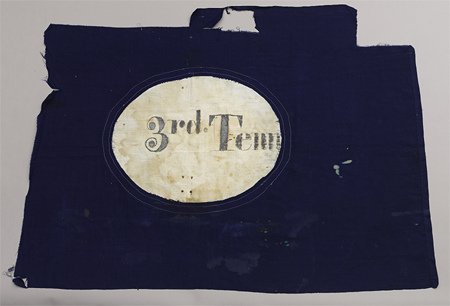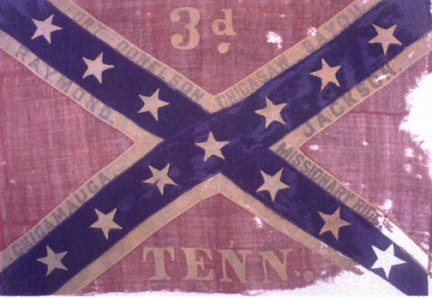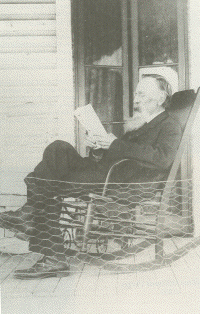Nathaniel F. Cheairs Biography
Nathaniel Francis Cheairs was born into the world on December 6, 1818. He was the youngest of ten children. He spent most his life in Maury County, TN near Spring Hill. He grew to be around six feet tall, had brown hair, gray eyes, and was of French descent.. He was very outspoken and made many friends as well as enemies. He was a Mason and a Methodist. He also smoked daily for all but the first ten years of his life. In 1841 he became engaged to the daughter of the wealthiest man in Maury County, Susan Peters McKissack. Before Nathaniel, there were five generations of other Nathaniel's all of whom married Sarah's. When Nathaniel announced his engagement, his father offered him $5,000 to break it off and marry a Sarah. Nathaniel turned the offer down and married Susan on September 2, 1841. He immediately proceeded to build a new residence a mile south of where he grew up. He was a perfectionist and had the walls torn down and rebuilt several times before being satisfied. He named is new home Rippavilla and hoped for it to stand for at least 100 years. It still stands today over 150 years later.
In October 1846, Nathaniel's father died and left him most of his land to him. Nathaniel's siblings felt the land was not divided evenly, including Nathaniel's mother, and a lawsuit was brought against him. The court held the will valid and Nathaniel kept the land. By 1860, Nathaniel had managed to have his land accumulated to 1,100 acres on which he grew crops. In 1842, Nathaniel and Susan gave birth to their first child Jannette. Three other children would soon follow: Thomas (1844), William (1849), and Sarah (1855). Nathaniel lived a prosperous life until 1861.
Nathaniel admitted he was against secession and in February 1861 cast his vote against Tennessee leaving the Union. When Lincoln called for 75,000 troops to put down the rebellion, Nathaniel had a change of heart and began recruiting an infantry company out of Maury County to fight for the Confederacy. He was elected Captain and took the company south to Lynnville, TN to join other companies to form the 3rd Tennessee Volunteer Infantry Regiment. Nathaniel's company being designated Company F. At the Regimental elections, Nathaniel was elected Major. The regiment moved to Camp Cheatham near Adams, TN and began drilling. They were soon moved to Bowling Green, KY where Nathaniel was put in charge as overseer for a section of fortifications around the town. In early 1862, the 3rd Tennessee regiment was ordered Fort Donelson on the Cumberland river near Dover, TN.
Upon their arrival the regiment was moved to the Confederate right flank on the outer defenses. Soon Grant's Federal army began to surround the fort and General Floyd of the Confederate army found the fort indefensible. A plan was devised to fight their way out of the fort by opening a road east and escaping to Nashville. At 4 a.m. February 15, with full knapsacks and three day's rations, the 3rd Tennessee was shifted to the Confederate left flank. At 8:30 a.m. the 3rd Tennessee and 14th Mississippi Infantry moved out across 400 yards of ground and overran a Federal Battery. They held the Federal entrenchments until noon, when another Federal battery began playing havoc on the Confederate lines. The 3rd Tennessee was shifted towards this position.
The 3rd, 18th, and 32nd Tennessee Regiments charged across the field coming under fire of canister from the Federal cannon. The 3rd halted and was ordered by Lieutenant Colonel Gordon to lay down and return fire. Gordon was commanding the regiment since Colonel Brown was commanding the brigade. Gordon was wounded shortly after giving this order and Major Nathaniel Cheairs himself took over command of the regiment. In the chaos of fighting the soldiers mistakenly took one of the orders to mean retreat and fell back about 100 yards to the rear. The Federals finding they could not hold their current position fell back and the 3rd regrouped and overtook their former position. The Confederates attacked a ridge where Grant formed a new defense, but the attack was unsuccessful. The 3rd Tennessee did not participate in this attack, but it did not matter the escape route had been opened.
For reasons Major Cheairs felt lacking substance, General Pillow ordered all Confederates back to their former positions inside the fort. The escape was called off. The regiment continued to fight with the Federal forces until dark and the engagement was broken off. In the middle of the night Major Cheairs was ordered to take the regiment in the direction of Dover. On his way he was stopped and given another order contradictory to his former order. Colonel Brown was sent for and after an hour of his regiment freezing in the cold weather went to Colonel Brown himself. It was then he learned the fort was to surrender the following day. He also found he was to be given the task of delivering the surrender to General Grant's Headquarters. They made a white flag out of a piece of Brown's tent and attached it to a hickory pole. Lieutenant Rhea, Bugler of the 3rd Tennessee, was to accompany him on his task. Colonel Brown told Rhea to blow the bugle call of surrender. Rhea responded he did not know what the surrender call sounded like. Brown responded, "Blow every call you know and if that does not do, blow your damn brains out." After playing every call he knew, Cheairs and Rhea approached the Federal lines beating on tin cans and ran into U.S. General Smith and his staff. Smith gave Cheairs a horse and put him under armed escort and had him taken to General Grant.
Grant replied to General Buckner's message and told Cheairs if he did not receive an answer within an hour and fifty minutes he would unleash his guns on the Confederates. It took Cheairs three and a half hours to reach General Buckner, but Grant never went through with the bombardment. At 6 a.m. on February 16, General Buckner unconditionally surrendered the garrison of Fort Donelson and Major Nathaniel Cheairs became a prisoner of war. Cheairs stated until the day he died he believed the fort should have never surrendered. Grant never closed the escape route after the Confederates abandoned the position. General Nathan B. Forrest managed to escape down the very route that night. Cheairs always felt the whole Confederate army could have easily escaped that night.

3rd Tennessee Flag surrendered at Fort Donelson
Major Cheairs was sent to St. Louis, then Camp Chase, OH, and finally to Fort Warren in the Boston Harbor. At Fort Warren he was treated very nicely and suffered little depravity. He was made a caterer at the Fort and claimed he spent roughly $6,000 on supplies from Boston. These supplies consisted of tobacco, wines, food, stationary, and postage. The prisoners were allowed to walk the grounds of the fort freely and Nathaniel was able to receive several letters from home. Most of his letters inquire on the family's status and the status of other officers held in the fort. He also found out from his family that the Federals were forging on the family land, but were still being treated with respect. Another frequent subject found in his letters is his total blame of the Fort Donelson debacle on General Pillow. He viewed Pillow's order to withdraw back to the fort and then abandoning his men and retreating to Nashville as one of the most cowardly acts ever committed. In July 1862, Cheairs was transported south to Virginia. Before leaving Fort Warren Nathaniel's outspoken personality apparently caused a heated argument with Colonel Randal McGavock, a fellow Confederate officer. The two had to be split up. Upon reaching the James River, his transport was delayed while the Federals bombarded Confederate positions. He was finally taken to Richmond and officially exchanged for Major Delozier Davidson of the 4th U.S. Infantry on August 27, 1862.
Cheairs made his way to Vicksburg, MS and was reunited with the 3rd Tennessee Infantry. Much to his disappointment, the regiment was reorganized and Nathaniel was not reelected Major. He soon found a position on the staff of General Nathan B. Forrest and was able to get his son Thomas on Forrest's staff as well. He participated in several battles with Forrest but in 1863 was transferred to the Commissary Department. In December 1863 he was detailed to retrieve cattle from Obion County, TN for Johnston's army. He was able to gather many but the Federal Cavalry began to move into the area and Cheairs left. Johnston found out of his return and sent him back to gather more. Though Nathaniel did not desire to, he obeyed orders and returned in early 1864. One day two Confederate scouts reported Federal Cavalry coming their way and Cheairs and two companions tried to flee. They got lost and ended up running straight into the Federals and taken prisoner for the second time.

Replacement 3rd Tennessee Flag
They were taken to Memphis and learned they were to be tried as spies. A charge which should not have stood due to the fact they were captured in uniform. Cheairs managed to arrange a meeting with Colonel Hurst. He convinced Hurst to drop the charges against him after proving himself a fellow Mason, but said the other two would still be executed. Nathaniel stated he wished them all to be let go or he himself would share their fate. Hurst agreed to let the others go and Cheairs was sent north to Camp Chase, OH. Nathaniel's stay at Camp Chase would not be as pleasant as his stay at Fort Warren. He received very few letters from home and was kept ignorant of the outside world except for what little the guards passed on. He was able to get on the Prison Hospital staff in February 1865 and shortly after was finally exchanged. He managed to find Forrest again at Selma, AL and fought his last engagement there. In May 1865, Major Nathaniel Cheairs surrendered for the third and final time.
Cheairs returned home to find his house had been plundered and declared Federal land and his family gathering government rations. He learned Hood had held a council of war at his home on November 30, 1864 after he learned the Federal army had escaped his trap at Spring Hill. One day the Deputy Marshal of Maury County came to his house and informed him he was to be tried for treason. Cheairs told him he would arrest him for no such thing. In the few days following the Marshal showed up again with more men but Nathaniel was gone to Washington D.C. He spoke with President Andrew Johnson who pardoned him for all charges and returned his land to him.

Nathaniel F. Cheairs c. 1910
He bought some land in Arkansas in 1866 and moved the family there for a short time until constant flooding forced him to sell the land and move back to Rippavilla. He spent the rest of his life there though traveling all over the country. He had a love for tropical climates and visited Florida frequently and even Cuba. In 1904 he purchased land in Texas and traveled between there and Tennessee constantly. In 1893 Nathaniel's wife Susan died and a few years later his son Thomas died as well. In 1902 he had an operation on his eye at St. Thomas Hospital in Nashville to fix his failing vision. In December 1913 during a visit to Texas he suffered stroke after having his afternoon smoke. His left side was paralyzed. He was interviewed by a Texas historian shortly after. His health never got better and on January 2, 1914 Nathaniel Cheairs died at the age of 95. He was taken back to Columbia, TN and buried in Rose Hill Cemetery next to his wife Susan.
Nathaniel F. Cheairs Grave at Rosehill Cemetery
All information from the book "I'll Sting if I Can" by Nathaniel Cheairs Hughes, Jr.